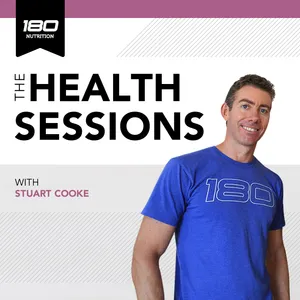Podcast Summary
Navigating the confusing world of nutrition and understanding the limitations of observational studies.: Be critical of scientific studies and use them as a starting point for further investigation into nutrition, as observational studies can only establish correlations, not causation.
Navigating nutrition can be challenging due to conflicting information. Mark Hyman highlights the confusion surrounding dietary recommendations, such as the fluctuating opinions on eggs and dietary fats. He addresses a specific study that gained attention by claiming a link between red meat consumption and type two diabetes. However, it's important to understand the limitations of observational studies like this one, which can only establish correlations, not causation. The study's design, inaccuracies, and flaws are examined to reveal that the increase in risk identified was relatively small and may not have significant meaning. Observational studies serve a purpose in generating hypotheses for future research, but they don't provide definitive proof. It's essential to critically evaluate scientific studies and consider them as a starting point for further investigation.
Limitations in the study on red meat and type 2 diabetes risk: The study on red meat and type 2 diabetes risk has limitations, including bias, flawed tools, lack of accounting for other factors, emphasizing the need for critical evaluation.
The study linking red meat consumption with an increased risk of type 2 diabetes has several limitations. The study authors had a bias towards a plant-based diet, which may have influenced the outcome. The study relied on flawed tools like food frequency questionnaires, which are known to have recall bias and can be misleading. Additionally, the study only showed an association or correlation, not causation. Other factors such as lifestyle choices, like smoking, alcohol consumption, lack of exercise, and poor overall diet, were not adequately accounted for in the study. It's important to critically evaluate the research and not jump to conclusions based on sensationalized headlines.
Limitations of Red Meat Study: Correlation vs. Causation: Red meat study finds a correlation between high intake and heart disease, but limitations in study design and reliance on observational data prevent definitive conclusions about causation. Consider other evidence for informed dietary decisions.
The study on red meat consumption and mortality cannot definitively prove that red meat causes heart disease or other health issues. The study found a correlation between high red meat intake and increased risk of heart disease, but it also acknowledged that the people in the high-risk group had other unhealthy habits like smoking, lack of exercise, and poor dietary choices. Moreover, the study itself had design flaws and relied on observational data, which is not strong evidence for causation. It is important to consider the limitations of studies and to look at the totality of evidence, such as randomized control trials and mechanistic studies, in order to make informed decisions about dietary choices.
Flaws in the study on red meat consumption and diabetes: The study's methodology and reporting have significant flaws, including inaccurate questionnaires, potential double counting of foods, measurement errors, and manipulated data, casting doubt on its conclusions.
The study on red meat consumption and diabetes has several notable flaws. Firstly, the food frequency questionnaires used to determine participants' dietary intake over time are highly inaccurate and not reliable for tracking outcomes. Additionally, the study included other foods like sandwiches and lasagna in the definition of red meat, causing potential double counting. The serving sizes also varied throughout the study, leading to confusion and measurement errors. Furthermore, the researchers used statistics to manipulate the data and reported calibrated numbers that exaggerated the risk associated with red meat consumption. The study's comparison of lowest to highest intake and use of qualitative metrics generated sensational headlines that may not accurately represent the true findings. Overall, the study's methodology and reporting raise doubts about its conclusions and aligning with existing data.
Flaws and Inconsistencies in a Study on Red Meat and Diabetes: This study's findings on the relationship between red meat and diabetes may be unreliable due to its failure to consider confounding factors, exclusion of relevant dietary components, and potential misleading of readers.
The study discussed has several flaws and inconsistencies that cast doubt on its findings. First, the study did not account for confounding factors such as body weight, physical activity, smoking, and vitamin consumption, which could have influenced the results. Additionally, the study excluded grains and sugar from its analysis, even though these are known contributors to diabetes. The reported calorie intake was also extremely low, suggesting unreliable data from food frequency questionnaires. Finally, the study emphasized relative risk rather than absolute risk, potentially misleading readers about the actual increase in disease risk. Overall, this study raises questions about the validity and reliability of its conclusions regarding the relationship between red meat and diabetes.
Understanding the importance of absolute risk and relative risk in research analysis and the potential pitfalls of relying solely on relative risk.: Don't be swayed by relative risk alone. Always critically evaluate statistics, consider biases, conflicts of interest, and other contributing factors in research studies.
When it comes to analyzing research studies, it's important to consider both absolute risk and relative risk. While relative risk may sound more significant, it can often be misleading. For example, in a study on the impact of red meat on diabetes risk, the relative risk showed a 62% increase in high red meat intake compared to low intake. However, when looking at the absolute risk, the actual increase was only two tenths of a percent. This emphasizes the need to critically evaluate statistics and not solely rely on relative risk to draw conclusions. Additionally, it's important to recognize potential biases and conflicts of interest in research studies, as they can impact the objectivity of the findings. Lastly, the role of other factors, such as sugar and refined carbohydrates, should not be overlooked when considering the mechanisms behind certain health outcomes.
The Connection Between Red Meat and Type 2 Diabetes: Red meat consumption should be part of a balanced diet that includes fruits, vegetables, and whole grains, and should be consumed in moderation to reduce the risk of cardiometabolic diseases.
The association between red meat consumption and type 2 diabetes is not as clear-cut as it may seem. While some studies suggest a link between the two, it's important to consider other factors like diet quality and overall eating patterns. Countries with healthier diets tend to have lower rates of diabetes, even when red meat is consumed. Additionally, evidence from randomized controlled trials contradicts the notion that red meat raises blood sugar levels or worsens insulin resistance. These trials actually show that lean and unprocessed red meat can have benefits for insulin sensitivity and postprandial glucose levels. Therefore, the key takeaway is that red meat should be consumed as part of a healthy eating pattern that includes fruits, vegetables, and whole grains, and in moderation to reduce the risk of cardiometabolic diseases.
The Importance of a Balanced Diet for Blood Sugar Control and Inflammation: Incorporating meat into a healthy diet, along with fruits, vegetables, nuts, seeds, and healthy fats, does not negatively affect blood sugar control or inflammation. Insulin resistance, the root cause of conditions like type 2 diabetes, is influenced by factors like high sugar intake and a sedentary lifestyle. Eliminating processed foods and focusing on good quality protein, fiber-rich foods, and healthy fats is essential. It is important to interpret observational studies cautiously and recognize that lean red meat itself is not linked to diabetes, but rather the consumption of sugary and refined foods.
The type of meat you eat and how it's incorporated into your diet matters. Studies have shown that if you consume meat as part of a healthy diet that includes fruits, vegetables, nuts, seeds, and healthy fats, it doesn't have a negative impact on your blood sugar control or inflammatory markers. The root cause of conditions like type 2 diabetes is insulin resistance, which is influenced by factors like a high intake of sugar, refined flour, and ultra-processed foods, as well as a sedentary lifestyle. To address this, it's important to eliminate processed foods and focus on consuming good quality protein, fiber-rich foods, and healthy fats. Testing your metabolic markers can help you understand your insulin resistance and overall cardiometabolic health. It's crucial to be cautious when interpreting observational studies and remember that lean red meat itself is not linked to diabetes, but rather it's the consumption of sugary and refined foods that pose a risk.





